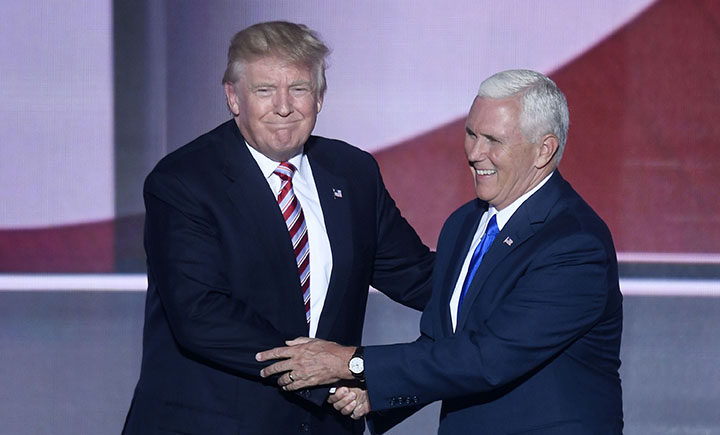In the maelstrom of despicable, outlandish, and destructive things President Trump has said and continues to say, I think some of his scarier sentiments have gone largely unnoticed. One that rattled me especially came in one of the Republican debates: Trump’s declaration regarding immigration that “Here we speak English,” which I consider the perfect representation of his blatant validation of xenophobia.
Perhaps worse than that, however, is when Mike Pence claimed in the VP debate that there is “too much of this talk of institutional bias or racism in law enforcement.” I was (and still am) afraid for the safety of the countless minorities threatened by the ignorance and inaction of people like the vice president.
Besides the fact that I think Pence is a cold and ruthless bigot who simply does not care for the well-being of the disenfranchised, his statement points to a widespread and dangerous lack of education regarding the nature of bias and how it works on a societal level.
Before I write further, I want to clarify something: I am a well-off, white, straight male. I do not pretend to have ever been confronted with homophobia, misogyny, racism, or any of the other biases that plague American society.
Now, where was I? Ah, yes; institutional racism. From conversations with more enlightened teachers, articles on social justice, and the superb Ava DuVernay documentary 13th, I’ve learned a whole lot about the true meaning of institutional racism as well as the misconceptions surrounding it.
Many white people (men in particular) seem to think that saying “institutional racism is a problem in law enforcement” is the same as saying “all cops are racists.” It depends on your definition of “racist,” but I think that word’s harsh connotations conjure an image of outright bigots (The Unite the Right crowd, for example) rather than ignorant fools.
Anyway, if I were to say “all cops were racist,” people would likely assume that I think every single member of law enforcement is a quintessentially prejudiced person who makes a conscious effort to harm those who belong to racial minorities. That’s not true, of course, but what people like Pence need to understand is that, as far as I can tell, no one’s really saying all cops are racist. That’s not the point of movements like Black Lives Matter.
As I understand it, the term “institutional racism” refers to the numerous racial biases that permeate the members of a group or organization. This can be applied to any human institution, really, of any size; a school, a city, or the world.
I prefer to think of institutional racism on the global scale, because that makes it clear that each and every human being is influenced, to varying degrees, by prejudice. That includes me, it includes you, and it includes cops.
I don’t know if police officers are, on average, more racially prejudiced than the rest of us. I don’t have the data to say whether they are or aren’t. But that’s not critical in proving the existence of institutional racism in law enforcement. Cops are human beings; thus, they are influenced by institutional racism.
The reason why institutional racism is more dangerous in the context of law enforcement, and why you often hear the two discussed together, is simple: cops have guns. The consequences of their biases can be deadly.
What makes institutional racism so hard to fight is the fact that so many people deny its existence. I read a book a year or so ago entitled Blindspot: Hidden Biases in Good People. The title does a nice job of getting the point across; in a nutshell, Blindspot is a study of institutional racism and all its subtleties.
What it did for me, though, was help me understand my role in perpetuating prejudice and what I have to do to fight it. A common reference point within the book is Harvard’s Project Implicit test, which diagnoses your degree of underlying bias. The approach is creative and fascinating; you can take it yourself here.
My result was something along the lines of “Moderate Bias;” I don’t remember the exact phrasing. That surprised me at first, but not once I stopped to think about it. I grew up in Seattle, a largely white city; lived in a largely white neighborhood; and went to an elementary school where the only students of color were either half-Asian or half-black (the other half being white).
Considering this, it would be a bit strange if I didn’t have any semblance of inherent racial prejudice. After all, racism is all about familiarity. We’re comfortable with what we know, and apprehensive about what we don’t.
I took this test as part of a racism discussion group back in my freshman year. When we met to discuss the test, my fellow members were horrified and disgusted by their results. I wasn’t. By no means was I proud to discover that I’m a little bit racist — indeed, I was disappointed — but I see my “Moderate Bias” diagnosis as a call to action rather than something to frown about.
I challenge you, dear readers, to recognize the inner racist. Once you do that, you can make a conscious effort to resist any of those subconscious motivations. You can’t fight an enemy if you deny its existence. The next step is to help others do the same. Once everybody confronts their hidden biases — that’s when we start making real strides towards eliminating institutional racism everywhere.


